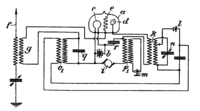Reflectional receiver

Okay kiddo, imagine you have a mirror in front of you. When you look at the mirror, you can see your reflection, right? That's pretty cool! Well, a reflectional receiver works kinda like a mirror but for something else, like light or sound.
Let's say you're standing in a big room and someone at the other end of the room shoots a laser pointer at you. If you have a reflectional receiver, you can catch the laser light and bounce it back to the person who shot it. They can then measure how long it took for the laser light to travel back and forth and use that information to figure out where you are in the room. It's like playing a game of catch with light!
The same thing can happen with sound too. Imagine you're standing in a big cave and you shout really loud. If you have a reflectional receiver, it can catch the sound waves that bounce off the cave walls and bounce them back to you. You'll hear an echo! Again, someone else can use this information to figure out where you are in the cave.
Reflectional receivers are really useful in lots of different ways. Scientists use them to study things like earthquakes or sound waves in the ocean. They can also be used for things like radar to help planes and ships navigate safely. Pretty cool, huh?
Let's say you're standing in a big room and someone at the other end of the room shoots a laser pointer at you. If you have a reflectional receiver, you can catch the laser light and bounce it back to the person who shot it. They can then measure how long it took for the laser light to travel back and forth and use that information to figure out where you are in the room. It's like playing a game of catch with light!
The same thing can happen with sound too. Imagine you're standing in a big cave and you shout really loud. If you have a reflectional receiver, it can catch the sound waves that bounce off the cave walls and bounce them back to you. You'll hear an echo! Again, someone else can use this information to figure out where you are in the cave.
Reflectional receivers are really useful in lots of different ways. Scientists use them to study things like earthquakes or sound waves in the ocean. They can also be used for things like radar to help planes and ships navigate safely. Pretty cool, huh?
